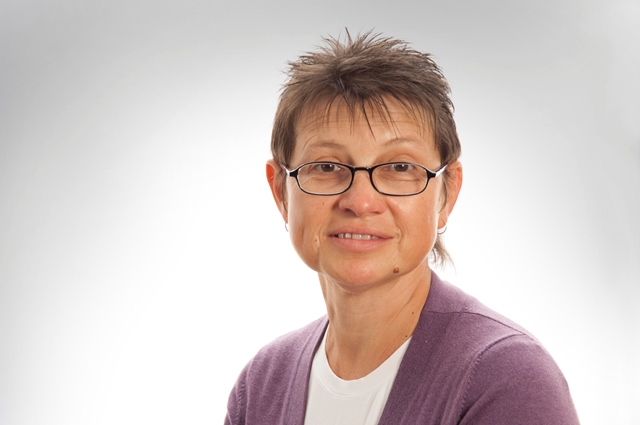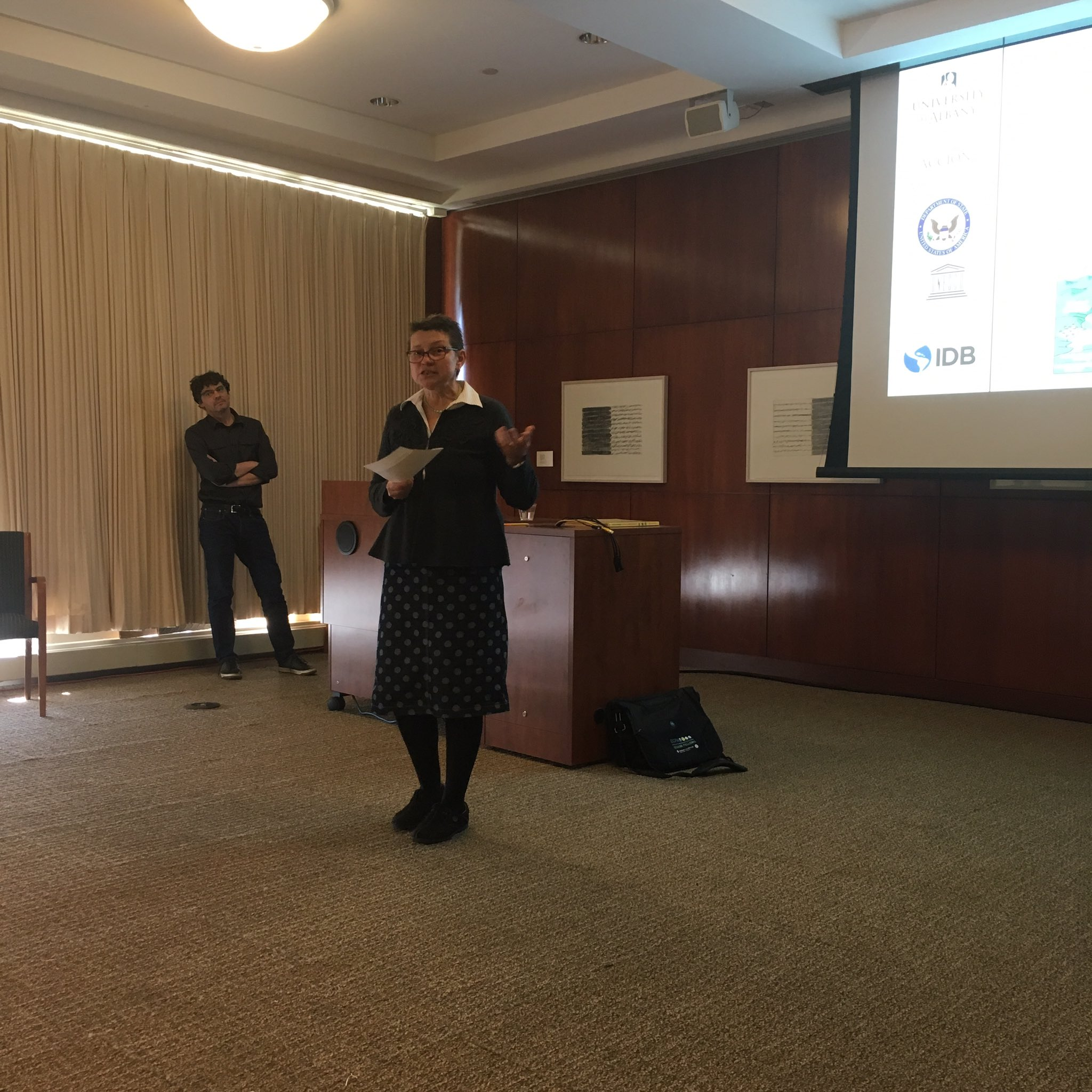On a November afternoon in 2020, a dozen first-year students file into an auditorium-style classroom in Lecture Center 21. For nearly 15 weeks, this routine has been the norm for their freshman seminar course, Food and Our Future, taught by Information Literacy Librarian Irina Holden. Except nothing about this class is routine. It isn’t a standard get-to-know-the-university workshop, but an introduction to science literacy, sustainability, and civic engagement.
While most classes treat the end of the semester as a wrap-up period, a time to look ahead to final exams and eschew new material, Food and Our Future isn’t like most classes. How many instructors would hold a teach-in promoting the UN Sustainable Development Goals? Irina isn’t like most professors, though, and her commitment to science literacy and sustainability shine through in her work.

Irina Holden
“Science literacy is tied very closely with sustainability,” Irina says. “It is crucial to determine how scientific advances can help us to mitigate the adverse effects of climate change and make sure the future generations will not suffer from the erroneous decisions made by our generation and our predecessors.”
From Ukraine to Albany
Irina’s interest in science has roots that extend more than 4,000 miles long, all the way to her native Ukraine. She received a combined BS/MS in Electrical Engineering from Lviv Polytechnic Institute. The academic program proved both rigorous and demanding. “We studied Monday through Saturday,” Irina said. “It was very science and technology intensive.”
In 1997, Irina emigrated from the Ukraine to the United States. She settled in New York, where she pursued a degree in Computer Technology from the Globe Institute of Technology. Not satisfied with that, she made her way to the University at Albany.
That’s what brought Irina to the Dewey Graduate Library one morning in November 2001. With her seven-month old son in her arms, she walked up to the circulation desk and asked for a job. “Peter Vonnegut was a head of circulation at Dewey at that time,” she explained. “He asked me if I was a student, and I said I was considering enrolling. He said, ‘I’ll hire you as long as you are a student here.’ So I enrolled for an MA in Russian, to pursue a career as a translator, but working at Dewey as a student assistant made me very much interested in the library profession, and by the end of the spring semester, I decided to enroll in the MSIS.”
Deborah Bernnard, Director of Public Services for the University Libraries, recalled Irina’s time as a graduate student. “I was working at Dewey when Irina was a GA there. Irina was a dedicated student assistant, and I know that her time at Dewey influenced her to pursue a Master’s Degree in Library Science.”
Irina didn’t stop there. She climbed the ranks at a rapid pace, moving up from a part-time temporary reference librarian to a full-time instructor and then as the Information Literacy and Science Outreach Librarian. She even took on a subject specialty in Russian and Slavic Studies in 2013.
During her studies in electrical engineering, Irina learned all about circuits and the paths through which currents travel. From Lviv, Ukraine to Albany, New York—from the Dewey Graduate Library to the Science Library—Irina’s journey has been forward moving and positively charged.
Working in the Science Library also gives Irina easy access to the Intensive English Language Program, whose office is located on the atrium level. For years, she has volunteered her time teaching information literacy sessions for students learning English. Her language profile, which includes Ukrainian, Russian, and Polish, also means Irina gets asked to meet visiting scholars and introduce them to campus.
Having an office in the Science Library also allows Irina to stay current in her field. During a recent conversation, she talked about the work done by molecular biologist Bonnie Bassler on quorum sensing, which is how bacteria communicate with each other. “It’s important to stay on top of research, to know the bibliography,” said Irina.
Irina’s scholarship reflects these interests. In 2010, she published a paper in the Journal of Library Administration titled “Science Literacy and Lifelong Learning in the Classroom: A Measure of Attitudes among University Students.” She followed that up with an article in 2012, in Communications in Information Literacy, titled “Predictors of Students’ Attitudes toward Science Literacy.”
Colleagues often remark at the breadth of Irina’s studies. Consider how Deborah speaks to the importance of her scholarship: “Information literacy is not ‘one size fits all.’ It can be very discipline specific. Many of the challenges that we are facing in today’s world, including climate change and the pandemic, require an understanding of how to find and interpret science data. Irina’s research focuses on finding effective ways to help students interpret and use science in order to achieve success in their academic careers and beyond. Her scholarship advocates for including science information literacy as a core educational goal.”

Irina introduces Dr. Mathias Vuille for Campus Conversations in Standish
The Importance of Science Literacy
Back in the Lecture Center, students in the Food and Our Future class listen to Irina talk about carbon offsets on campus, about the Libraries’ role in addressing sustainability, and about her own participation in community gardens. The Sustainable Development Goals are no longer abstract talking points administered by a global governance institution, but actionable items students can work on in their everyday life.
Irina notes: “Science literacy is extremely important in the lives of people in our modern society. So many decisions, political and economic, are based on constantly-evolving technological and scientific advances. These are both beneficial to the lives of people (health care, internet, transportation), and at times detrimental (weapons of mass destruction and pollution, to name a couple). To achieve balance between the two powers, we need an educated electorate who can understand what the scientific advances can possibly mean for the future of humanity and let their legislators know how they should be addressing these issues when drafting policies.”
Irina’s enthusiasm is contagious, as is evidenced by her students’ performances. She carries herself with an authenticity that is inescapable. She is who she is, and she is proud of it. She cites a Swedish writer Astrid Lindgren, known to American readers for her Pippi Longstocking books, as her hero, because she influenced the Swedish government to enact a law for protection of farm animals.
“Librarians are educators, and I see our role as leaders in sustainable movement in many ways: teaching students, being involved in sustainability work on an institutional level, and demonstrating personal sustainable behaviors.”